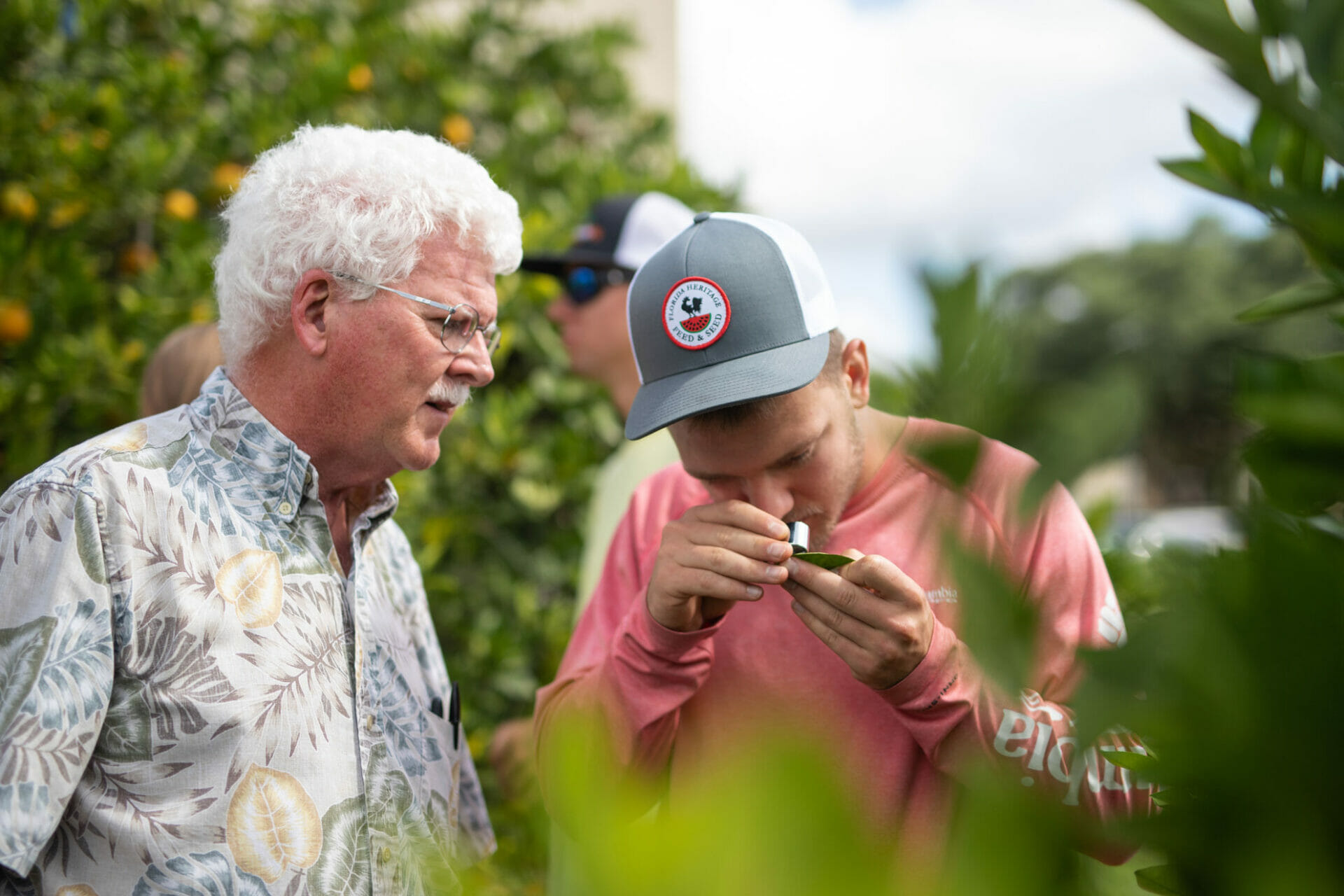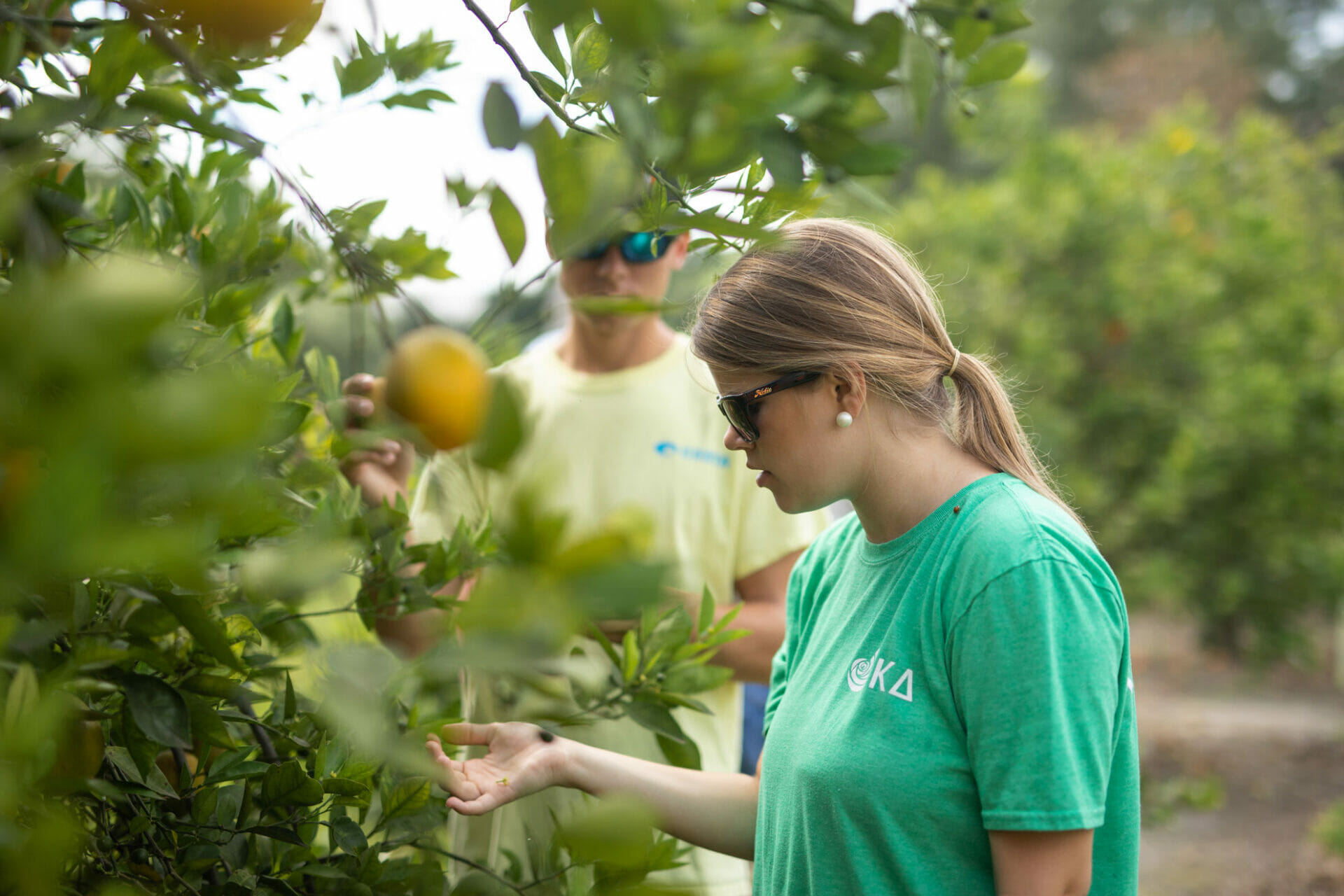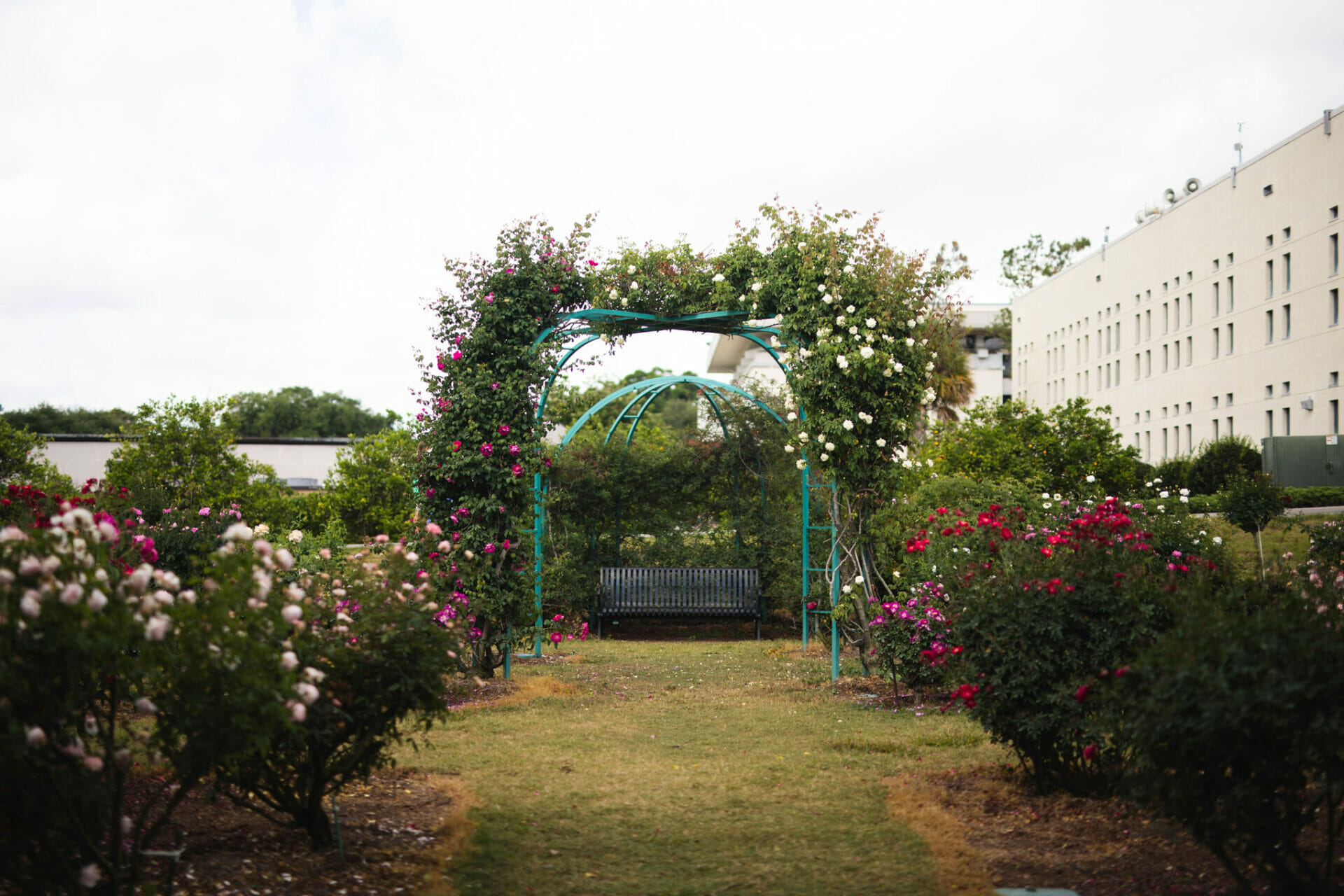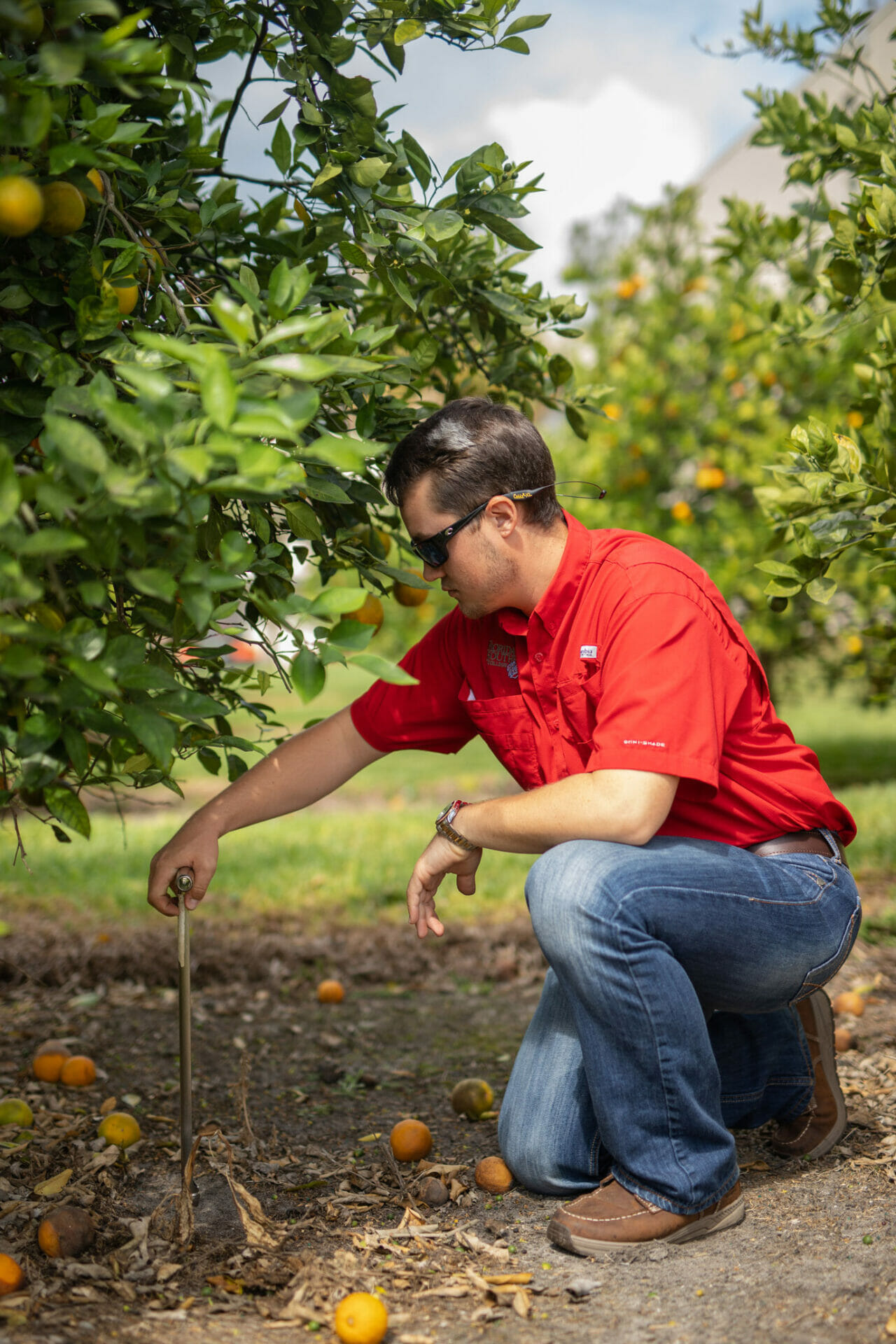Photography by Drew Blaser
As the only horticultural science program in the nation that specifically emphasizes citrus, Florida Southern College has cultivated a program that not only equips students to later thrive in their careers, but also to give back to an industry that plays an important role in the life of a Floridian.
Although citrus trees are not indigenous to Florida, they are intimately tied to its identity today. From the moment you cross into the Sunshine State, visitors are warmly greeted with billboards encouraging them to stop by the Official Florida Welcome Centers for a free sample of Florida citrus juice. Along with tall palm trees, orange groves are the iconic image that often comes to mind when imagining the beauty that makes up Florida. There’s no denying that citrus is Florida’s staple crop.
Yet, citrus first arrived to the state in the 16th century when European explorers established themselves in Florida. The early settlers planted the first orange trees around St. Augustine, and Florida’s unique subtropical climate proved an ideal environment to flourish. In the 19th century, the citrus industry truly began to boom as the expansion of railroads throughout the state made it easier to commercialize.
During World War II, scientists were able to develop techniques to create a frozen concentrated orange juice in order to provide adequate Vitamin C to American troops. With the ability to ship orange juice now accessible, the citrus industries’ production increased greatly. After the war ended, many former military people under the G.I. Bill were seeking education, and Florida Southern College (FSC) perceived a growing need for training in the citrus industry.
[modula id=”17982″]
“There was no specific training available at the undergraduate level, and the industry needed management-level people,” says Dr. Malcolm Manners, chair of the Citrus and Horticultural Science program at FSC. “At first it was strictly citrus, then in the 1970s, broader aspects of horticulture were added.”
Due to this need, FSC would begin a program that continues to equip its students for viable career paths that foster Florida’s citrus and horticulture identity. Since its initial inception in the ’70s, the program has evolved based on the careers needed. Some of the current core program courses consist of the basics, such as crop production, soils, plant nutrition, and pest and disease management. Today, FSC has the nation’s only bachelor’s degree program that specifically focuses on citrus. This program is known throughout Florida’s citrus industry for its quality.
From there, students choose one of the many offered career tracks. “Most students do at least two of the career tracks,” says Manners. Among these tracks include Citrus, which focuses on commercial citrus production, harvesting, processing, and marketing; Business, which equates to a minor in business management; Biotechnology, which has an emphasis on laboratory skills for new variety development; and pre-graduate studies, which includes extra coursework in chemistry, mathematics, and biology in order to prepare students for admission into graduate programs and, potentially, research careers.
 Horticulture programs are not uncommon. However, they are usually offered at large land-grant universities, so it is unique to have such a program exist at a small, private school like FSC. “To have a program that emphasizes citrus specifically is unique. Unlike a large state school where the primary emphasis may be to prepare students for graduate school, we’ve emphasized preparing students for careers in the industry with the bachelor’s degree — although, certainly numerous of our alumni have gone to grad school and done quite well there,” says Manners.
Horticulture programs are not uncommon. However, they are usually offered at large land-grant universities, so it is unique to have such a program exist at a small, private school like FSC. “To have a program that emphasizes citrus specifically is unique. Unlike a large state school where the primary emphasis may be to prepare students for graduate school, we’ve emphasized preparing students for careers in the industry with the bachelor’s degree — although, certainly numerous of our alumni have gone to grad school and done quite well there,” says Manners.
“To have a program that emphasizes citrus specifically is unique. Unlike a large state school, where the primary emphasis may be to prepare students for graduate school, we’ve emphasized preparing for careers in the industry with the bachelor’s degree.”
FSC’s location in Central Florida puts students at the heart of citrus productions. The campus is in close proximity to the Citrus Research and Education Center in Lake Alfred, allowing industry experts to often guest lecture to these students. The program allows those pursuing careers in citrus and horticulture invaluable connections in multiple ways. “Each student does a summer-long internship, usually between the junior and senior years, with a business of their choice, to gain real-world experience in a specific niche of the industry that interests them,” says Manners.
Along with an emphasis on career development, what makes FSC’s program stand out, compared to other programs throughout the country, are the opportunities available for hands-on experiences. “Nearly all classes have a laboratory component,” says Manners. These labs offer students the ability to learn all aspects of plant propagation, planting and cultivation techniques, soil testing, environmentally responsible irrigation and fertilizer programming, pest and disease identification and management, and safe and responsible handling of agricultural chemicals.

The natural beauty that surrounds FSC’s campus only adds value to these out-of-classroom, hands-on experiences. FSC’s campus has a collection of citrus trees. For example, the James dePass Citrus Grove’s layout and variety were designed to mirror that of modern commercial groves. It includes an irrigation system and gives students the opportunity to experiment with grove management operations, pest and disease management, and post-harvest practices.

In addition, there are beautiful rose gardens throughout the campus, two of which contain roses propagated by Manners himself. Ruth’s Rose Garden is one of the most genetically diverse rose gardens in the Southeast and specializes in rare roses from throughout history. Students of the Citrus and Horticulture classes have the opportunity to participate in a service-learning project, propagating plants from this garden and then relocating them to New York each spring to help beautify gardens in Harlem. This project teaches children how to propagate and grow their own gardens.
“We want to provide to the greater citrus and horticultural industries people well-trained and competent to enter at a managerial level, and to quickly become leaders in their field,” says Manners. It’s safe to say FSC is accomplishing just that as many students who complete this degree go on to an array of needed professions in the citrus and horticulture industry. “We estimate that well over half of all management positions in the Florida citrus industry are held by our graduates,” says Manners. Others go on to work for the State Department of Agriculture, government programs, teaching, or graduate school to pursue professional research careers.
“We want to provide to the greater citrus and horticultural industries people well-trained and competent to enter at a managerial level, and to quickly become leaders in their field.”
 However, as baby boomers are nearing retirement and mid-management looks to step down from their lifetime careers, a new generation of leaders are needed to rise up and fill these positions. “The industry needs well-educated people, and there is currently a shortage of people,” says Manners. As viable solutions are being developed to combat greening (a disease that affects citrus trees’ ability to flower and fruit) and other diseases, the job market will grow even larger than the program’s beginnings. “There are excellent positions available,” says Manners.
However, as baby boomers are nearing retirement and mid-management looks to step down from their lifetime careers, a new generation of leaders are needed to rise up and fill these positions. “The industry needs well-educated people, and there is currently a shortage of people,” says Manners. As viable solutions are being developed to combat greening (a disease that affects citrus trees’ ability to flower and fruit) and other diseases, the job market will grow even larger than the program’s beginnings. “There are excellent positions available,” says Manners.
Florida Southern College has created a leading program to best equip its students not only to fill these positions but excel in them in order to continue cultivating the beauty that covers our Sunshine State. As Manners says, “A career in horticulture is varied and fascinating. The industry’s future is bright.”
